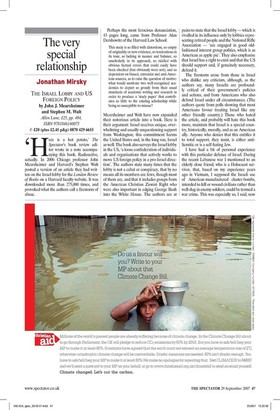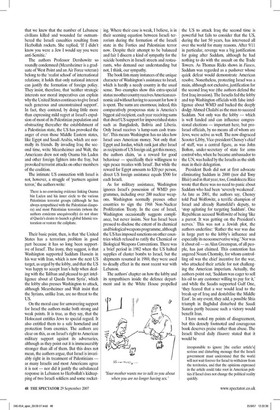The very special relationship
Jonathan Mirsky THE ISRAEL LOBBY AND US FOREIGN POLICY by John J. Mearsheimer and Stephen M. Walt Allen Lane, £25, pp. 484, ISBN 9781846140075 £20 (plus £2.45 p&p) 0870 429 6655 H ‘ ere is a hot potato,' The Spectator's book review editor wrote in a note accompanying this book. Radioactive, actually. In 2006 Chicago professor John Mearsheimer and Harvard's Stephen Walt posted a version of an article they had written on the Israel lobby for the London Review of Books on a Harvard faculty website. It was downloaded more than 275,000 times, and provoked what the authors call a firestorm of abuse.
Perhaps the most ferocious denunciation, 43 pages long, came from Professor Alan Dershowitz of the Harvard Law School: This study is so filled with distortions, so empty of originality or new evidence, so tendentious in its tone, so lacking in nuance and balance, so unscholarly in its approach, so riddled with obvious factual errors that could easily have been checked (but obviously were not), and so dependent on biased, extremist and anti-American sources, as to raise the question of motive: what would motivate two well-recognised academics to depart so grossly from their usual standards of academic writing and research in order to produce a 'study paper' that contributes so little to the existing scholarship while being so susceptible to misuse?
Mearsheimer and Walt have now expanded their notorious article into a book. Here is their argument: Israel receives unique, overwhelming and usually unquestioning support from Washington; this commitment harms the United States and, in the long run, Israel as well. The book also surveys the Israel lobby in the US, 'a loose confederation of individuals and organisations that actively works to move US foreign policy in a pro-Israel direction'. The authors state many times that the lobby is not a cabal or conspiracy, that by no means all its members are Jews, though most of them are, and that it includes groups from the American Christian Zionist Right who were also important in edging George Bush into the White House. The authors are at pains to state that the Israel lobby — which is rivalled in its influence only by lobbies representing retired people and the National Rifle Association — 'are engaged in good oldfashioned interest group politics, which is as American as apple pie'. They also emphasise that Israel has a right to exist and that the US should support and, if genuinely necessary, defend it.
The firestorm arose from those in Israel who dislike any criticism, although, as the authors say, many Israelis are profoundly critical of their government's policies and actions, and from Americans who also defend Israel under all circumstances. (The authors quote from polls showing that most Americans favour treating Israel like any other friendly country.) Those who hated the article, and probably will hate this book more, maintain that Israel is a special country, historically, morally, and as an American ally. Anyone who denies that this entitles it to total support, they insist, is either antiSemitic or is a self-hating Jew.
I have had a bit of personal experience with this particular defence of Israel. During the recent Lebanese war I mentioned to an elderly close friend, who is a Holocaust survivor, that, based on my experience years ago in Vietnam, I supposed the Israeli use of American-manufactured cluster-bombs, intended to kill or wound civilians rather than well-dug-in enemy soldiers, could be termed a war crime. This was especially so, I said, now that we knew that the number of Lebanese civilians killed and wounded far outnumbered the Israeli casualties resulting from Hezbollah rockets. She replied, 'If I didn't know you were a Jew I would say you were anti-Semitic.'
The authors Professor Dershowitz so roundly condemned (Mearsheimer is a graduate of West Point and an Air Force veteran) belong to the 'realist school' of international relations; it holds that only national interest can justify the formation of foreign policy. They insist, therefore, that 'neither strategic interests nor moral imperatives can explain why the United States continues to give Israel such generous and unconstrained support'. In fact, they contend, by doing little more than expressing mild regret at Israel's expulsion of most of its Palestinian population and obstructing thereafter the establishment of a Palestinian state, the US has provoked the anger of even those Middle Eastern states, like Egypt and Saudi Arabia, which are normally its friends. By invading Iraq the second time, write Mearsheimer and Walt, the Americans drew not only Osama bin Laden and other foreign fighters into the fray, but provoked terrorist attacks on other members of the coalition.
The intimate US connection with Israel is not, however, a struggle of 'partners against terror,' the authors write: There is no convincing evidence linking Osama bin Laden and his inner circle to the various Palestinian terrorist groups (although he has always sympathised with the Palestinian diaspora) and most Palestinian terrorists (whom the authors condemn unequivocally) do not share al Qaeda's desire to launch a global Islamic restoration or restore the caliphate.
Their basic point, then, is that `the United States has a terrorism problem in good part because it has so long been supportive of Israel'. The irony, they suggest, is that Washington supported Saddam Hussein in his war with Iran, which is now the next US target, as urged by the lobby, and that the US 'was happy to accept Iran's help when dealing with the Taliban and pleased to get intelligence about al Qaeda from Syria', which the lobby also presses Washington to attack, although Mearsheimer and Walt insist that the Syrians, unlike Iran, are no threat to the US.
On the moral case for unwavering support for Israel the authors make both strong and weak points. It is true, as they say, that the Holocaust entitles Jews to special regard. It also entitled them to a safe homeland and protection from enemies. The authors are clear on this, as on Israel's right to American military support against its adversaries, although as they point out it is immeasurably stronger than all of them. But this does not mean, the authors argue, that Israel is invariably right in its treatment of Palestinians — as many Israelis and most Americans agree it is not — nor did it justify the unbalanced response in Lebanon to Hezbollah's kidnapping of two Israeli soldiers and some rocketing. Where their case is weak, I believe, is in their seeming equation between Israeli terrorism during the formation of the Israeli state in the Forties and Palestinian terror now. Despite their attempt to be balanced and fair I discern a kind of sympathy for the suicide bombers in Israeli streets and restaurants, who demand our understanding but not, I think, our sympathy.
The book lists many instances of the unique character of Washington's assistance to Israel, which is hardly a needy country in the usual sense. Two examples show this extra-special status: no other country receives American economic aid without having to account for how it is spent. The sums are enormous; indeed, this comparatively prosperous state is America's biggest aid recipient, each year receiving sums that dwarf US support for impoverished states such as Bangladesh, Bolivia and Liberia. Only Israel receives 'a lump-sum cash transfer'. This means Washington has no idea how Israel uses American money. Not only that: Egypt and Jordan, which rank just after Israel as recipients of US foreign aid, get this money, the authors claim, 'as a reward for good behaviour — specifically their willingness to sign peace treaties with Israel'. But while the reward for Egypt amounts to $20 per person, direct US foreign assistance equals $500 for each Israeli.
As for military assistance, Washington ignores Israel's possession of WMD programmes, including over 200 nuclear weapons. Washington normally presses other countries to sign the 1968 Non-Nuclear Proliferation Treaty. In the case of Israel, Washington occasionally suggests compliance, but never insists. Nor has Israel been pressed to disclose the extent of its chemical and biological weapons programme, although the US has imposed sanctions on other countries which refused to ratify the Chemical or Biological Weapons Conventions. There was a brief period in 1982 when the US halted supplies of cluster bombs to Israel, but the shipments resumed in 1988; they were used to deadly effect in the most recent war with Lebanon.
The authors' chapter on how the lobby and its sympathisers inside the defence department and in the White House propelled the US to attack Iraq the second time is powerful but fails to consider that the US, during the last 50 years, has intervened all over the world for many reasons. After 9/11 in particular, revenge was a big justification for going after Saddam, although he had nothing to do with the assault on the Trade Towers. As Thomas Ricks shows in Fiasco, Saddam was regarded as a pushover whose quick defeat would demonstrate American resolve. Nonetheless, protecting Israel was a main, although not exclusive, justification for the second Iraq war (the authors defend the first Iraq invasion). The Israelis fed the lobby and top Washington officials with false intelligence about WMD and backed the deeply dodgy Ahmed Chalabi as the man to succeed Saddam. Not only was the lobby — which is well funded and can influence congressional elections — important here, but proIsrael officials, by no means all of whom are Jews, were active as well. The now disgraced Scooter Libby, Vice-president Cheney's chief of staff, was a central figure, as was John Bolton, under-secretary of state for arms control who, when he became ambassador to the UN, was hailed by the Israelis as the sixth man in their delegation.
President Bush did not at first advocate eliminating Saddam in 2000 (nor did Tony Blair) and in that year, too, Condoleeza Rice wrote that there was no need to panic about Saddam who had been 'severely weakened'. As late as 2001, the authors say, Cheney told Paul Wolfowitz, a terrific champion of Israel and already Rumsfeld's deputy, to 'stop agitating for targeting Saddam'. One Republican accused Wolfowitz of being 'like a parrot. It was getting on the President's nerves.' This was not a Jewish plot, the authors underline: 'Rather the war was due in large part to the lobby's influence and especially its neoconservative wing.' Nor was it about oil — as Alan Greenspan, of all people, has just claimed. This contention has angered Noam Chomsky, for whom controlling oil was the chief incentive for the war, who attacked their article for not challenging the American imperium. Actually, the authors point out, 'Saddam was eager to sell his oil to any customer willing to pay for it,' and while the Saudis supported Gulf One, 'they feared that a war would lead to the break-up of Iraq and destabilise the Middle East'. In any event, they add, a possible Shia triumph in Baghdad disturbed the Saudi Sunnis partly because such a victory would benefit Iran.
I have noted my points of disagreement, but this densely footnoted and courageous book deserves praise rather than abuse. The Israeli liberal daily Haaretz stated that it would be irresponsible to ignore [the earlier article's] serious and disturbing message that the Israeli government must understand that the world will not wait forever for Israel to withdraw from the territories, and that the opinions expressed in the article could take root in American politics if Israel does not change the political reality quickly.
























































 Previous page
Previous page